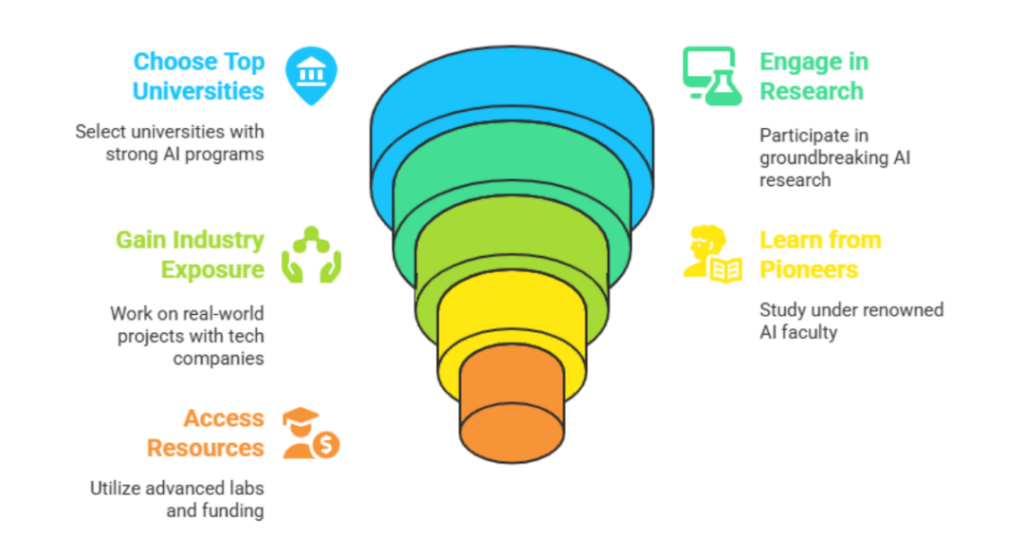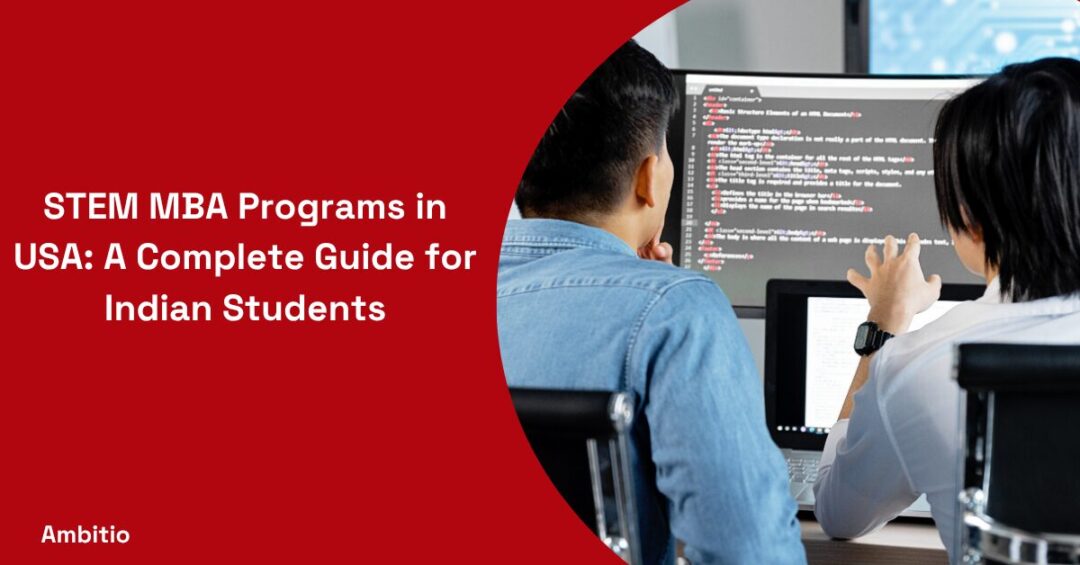3 July 2025
7 minutes read
10 Best Universities In USA For Artificial Intelligence For Indian Students

Key Takeaways
- Best universities in USA for artificial intelligence include Carnegie Mellon, Stanford, and MIT with avg. salaries over $130K.
- AI programs in top US universities offer real research, industry projects, and strong job outcomes.
- Strong portfolios, targeted SOPs, and faculty-aligned applications improve MS admission chances.
In 2024 alone, the U.S. hired over 125,000 data scientists, yet somehow, everyone on LinkedIn still wants to “leverage AI to solve real-world problems.” Here’s what, breaking into artificial intelligence isn’t about buzzwords or bootcamps; it’s about getting into the right university that actually builds the future of AI. But for Indian students, the path is a minefield—high tuition, confusing rankings, fake counsellors, and universities that promise “AI programs” but barely offer TensorFlow.
You don’t need hype—you need Carnegie Mellon’s neural networks, Stanford’s NLP labs, and Michigan’s machine learning pipelines. This list doesn’t waste time. It gives you the real top universities in the USA for AI—where the code meets research, and where Indian talent belongs.
Why Study MS In Artificial Intelligence (AI) In USA?
Everyone suddenly wants to become an AI engineer, but no one knows where the real magic happens. Instagram reels scream “Learn machine learning in 30 days,” and yet none of them tell you that Carnegie Mellon University has been doing AI research before most people knew what algorithms even were. Indian students dreaming of a solid degree in artificial intelligence don’t just need another buzzword-heavy AI program—they need the real deal.

The kind built inside the labs of Stanford University, Harvard University, and the University of California—not a YouTube playlist titled “AI for Beginners.” If you’re aiming to become a world-class data scientist, the U.S. isn’t just an option—it’s the epicenter. Here’s why.
1. The U.S. Built the Blueprint of AI Before the World Caught Up
From early neural nets to today’s large language models, the U.S. led the AI revolution. Schools like Stanford University, Carnegie Mellon University, and MIT were publishing groundbreaking AI research while the rest of the world was still figuring out floppy disks. Most of the AI tools Indian students now rely on—TensorFlow, PyTorch, GPT—originated from top universities in the U.S. Want to master AI? Start where it was born.
2. Degrees That Actually Lead to Jobs (Not Just Certificates)
A degree in artificial intelligence from a U.S. institution isn’t just academic fluff—it’s your passport into companies like Google, Meta, OpenAI, and NVIDIA. Most MS in Artificial Intelligence programs here are tied directly to industry labs and funded research, giving Indian students not just knowledge, but exposure. The University of Washington, for example, lets you work on real-world projects with Amazon and Microsoft just down the street.
3. World-Renowned Faculty and Research Labs
You’re not just learning computer science from a textbook—you’re learning it from the people who wrote the textbook. Whether it’s machine learning, data science, or robotics, U.S. universities attract top-tier talent. Think Geoffrey Hinton’s early work at University of Toronto influencing AI programs at Harvard University or autonomous vehicle breakthroughs led by researchers at the University of Michigan and Stanford. Your professors aren’t just teachers—they’re pioneers.
4. Funding, Labs, and Resources You Can’t Even Dream of
This isn’t just about classrooms with whiteboards. U.S. schools like Princeton University and the University of California campuses (especially Berkeley and UCLA) are powerhouses of funding. These schools invest millions in AI programs, offer grants for international students, and run exclusive labs for data science and machine learning innovation. You’re not learning in a vacuum—you’re building in real-world labs that test ideas at global scale.
5. Global Reputation = Global Job Market
You can brag all you want about “learning AI on Coursera,” but recruiters know the difference. A master’s from one of the best universities in the U.S. carries serious weight in the global tech ecosystem. The ranking of your school can directly influence your job interviews. Graduating from places like Carnegie Mellon University or University of Washington means you don’t introduce yourself as a “tech enthusiast”—you show up as a credible data scientist ready to ship AI products.
10 Best Universities In USA For Artificial Intelligence For Indian Students
“Learn AI in 3 weeks” is a myth sold by influencers, not researchers. If you really want to study artificial intelligence and build a future in the field of AI, you don’t scroll through Instagram reels—you gear up for some serious brainwork at the best universities for artificial intelligence in the world. And no, these aren’t random picks from a paid blog—they’re backed by actual QS World University Rankings, alumni success, and cutting-edge AI courses.
You’re aiming for a bachelor’s degree, bs in computer science, or a master’s in artificial intelligence program, these top colleges in the USA for Indian students are where innovation isn’t a trend—it’s a lifestyle. This list isn’t long because there aren’t many US universities that actually live and breathe AI research—just the best colleges that matter.
| University | Avg. Tuition Fee (per year) | Avg. Salary (AI Graduates) |
|---|---|---|
| Carnegie Mellon University | $58,000 | $138,000 |
| Stanford University | $61,731 | $142,000 |
| Massachusetts Institute of Technology (MIT) | $57,590 | $150,000 |
| University of California, Berkeley | $48,465 | $135,000 |
| University of Washington | $39,114 | $128,000 |
| University of Michigan | $50,872 | $126,000 |
| University of Southern California | $60,446 | $127,000 |
| Harvard University | $54,032 | $140,000 |
| University of Illinois at Urbana-Champaign | $39,984 | $123,000 |
| University of Pennsylvania | $60,042 | $132,000 |
6 Effective Tips To Get Admission In Top Universities For Masters
The number of universities offering AI courses may be rising, but getting into the best colleges—especially the ones that show up on the QS World University Rankings—takes a hell of a lot more than just a decent GPA and “passion for AI” written in Times New Roman.
Here’s what we recommend:
1. Stop Applying Blindly—Target Programs Based on Faculty Research
Every university has a glossy brochure, but only a few like University of Pennsylvania, University of Illinois at Urbana, or University of Southern California have professors who are publishing real AI research in journals that matter. Don’t just Google “top colleges”—dig into what AI courses each program in artificial intelligence offers, what labs they’re running, and what science and artificial intelligence projects students are involved in. Admissions love applicants who know what the faculty is building—because it shows you’re not just applying everywhere like a headless bot.
2. Build a Portfolio That Screams “I Do, Not Just Dream”
Your SOP might say you’re passionate about artificial intelligence, but if your GitHub is empty and Kaggle is silent, you’re just another buzzword generator. If you’re targeting masters in artificial intelligence programs, especially in US universities like University of Maryland or Northeastern University, you must have hands-on experience—think AI models, data analysis, or published papers. Show them you understand artificial intelligence for data, using artificial intelligence in real-world contexts, or even side projects in math and computer science.
3. Your Undergrad Doesn’t Have to Be IIT, But Your Story Better Be Gold
Sure, having a computer science major from a top Indian college helps, but universities in the USA also admit students with a bachelor’s degree from lesser-known colleges—if they can demonstrate clarity, ambition, and a killer narrative. Many research universities like Arizona State University, University of South Florida, or Brigham Young University don’t just care where you’re from—they care where you’re going. Tie your story to your long-term goals in the field of AI, not just why “AI is the future.”
4. Recommendations That Actually Say Something
A generic “He is hardworking and sincere” LOR won’t get you into top colleges like University of Illinois, Harvard, or University of Georgia. What helps? Recommenders who know your work in programs in computer science, your contributions to AI projects, or how you’ve led teams using specialized computer science skills including artificial intelligence. Strong, detailed, context-backed LORs = application gold.
5. Don’t Chase Rankings Blindly—Chase Fit
The QS World University Rankings are great for clout, but they don’t always reflect your fit. Some universities around like University of New Hampshire, National University, or University of Illinois at Chicago may not be globally hyped but offer MS programs that are tightly industry-connected. AI in the USA isn’t just about name—it’s about relevance, faculty, job pipelines, and where AI graduates in the USA actually end up working.
6. Know the Real Costs (Not Just Tuition)
Most students plan for tuition but forget that the cost of studying an MS in the USA for Indian students also includes living, travel, visa, and yes, stress. Studying an MS in AI at universities in the world like Stanford or MIT costs more than just money—it costs time, mental bandwidth, and relentless effort. Plan accordingly. Make peace with 2 years of hustle and heartbreak—because artificial intelligence jobs don’t come easy. But when they do, they change your life.
Conclusion
Look, the top US universities offering AI don’t just teach it—they drive its future. So if you’re serious about studying MS in artificial intelligence, want to break into artificial intelligence jobs, and actually matter in this next-gen tech race, this blog is your first real step. Everything else? Just background noise.
To get into a top U.S. university isn’t just about grades—it’s about strategy. Ambitio’s AI-powered platform and expert consultants help you tackle applications, study gaps, and visa approvals with confidence. No confusion, no wasted time—just a clear path to your dream school. So if you want to study in USA, Ambitio is the answer.
FAQs
What is the best university in the USA for artificial intelligence?
Determining the “best” university depends on your specific interests and career goals. MIT, Carnegie Mellon, Stanford, and Harvard consistently rank among the top choices, but there are many other excellent institutions to consider.
Can I pursue an undergraduate degree in artificial intelligence in the USA?
Yes, many universities in the USA offer undergraduate programs in AI or related fields like computer science and machine learning. These programs provide a strong foundation for AI studies.
Are there scholarships available for AI students in the USA?
Yes, many universities offer scholarships and financial aid to AI students based on merit and need. Be sure to check with individual universities for their scholarship opportunities and application deadlines.
What are the job prospects for AI graduates in the USA?
Job prospects for AI graduates in the USA are excellent. AI professionals are in high demand across various industries, including tech, healthcare, finance, and more. Salaries for AI experts are competitive, making it a lucrative field to enter.
How can I apply to these universities for AI programs?
To apply, visit the official websites of the universities you’re interested in and follow their application procedures. Each university may have its own requirements and deadlines, so be sure to plan accordingly. Be prepared to submit transcripts, standardized test scores, letters of recommendation, and a statement of purpose that outlines your interest in AI and your career goals.

You can study at top universities worldwide!
Get expert tips and tricks to get into top universities with a free expert session.
Book Your Free 30-Minute Session Now! Book a call now




























